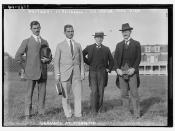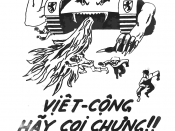Detailed examination and analysis of the Pentagon Papers elucidates the flaws inherent in the Kennedy Administration's policy towards the Diem regime in the summer and fall of 1963, which led to Diem's overthrow and a deeper American commitment to the Vietnam War. As the argument presented in this paper will heretofore demonstrate, the basis for a critique of the Kennedy Administration's policy towards the Diem regime lies in the capriciousness of its decision to lend covert support to a military coup without sufficient evidence that such a move was ultimately in the best interest of American foreign policy objectives in Vietnam.
While the information presented in the Pentagon Papers is oftentimes confusing and contradictory, there are a few major points that resonate throughout and which establish a number of facts with relative certitude. That Diem was difficult to deal with, from the perspective of American diplomats enlisted in the process of conducting American foreign policy aims in Vietnam, is quite evident and almost entirely indisputable.
Throughout the Pentagon Papers it is repeatedly made clear that Diem was a stubborn, autocratic ruler who placed little value on the opinions expressed by the United States government with relation to the process of the governing Vietnam. His regime was, "frequently criticized for being a dictatorship" with a narrow-minded political approach (Hereafter footnoted Pentagon Papers).1
Diem's intransigence in the face of repeated U.S. attempts to influence his approach to domestic political affairs is expressed in multiple perspectives contained in the Pentagon Papers which present a clear picture of Diem's consistent and intentional aloofness to stated American interests. In particular, Diem's overall attitude of defiance was expressed most frequently in his interactions with U.S. Ambassadors Nolting, and later Lodge. Despite the fact that Nolting and Lodge employed methods of dealing with the stubborn despot...


